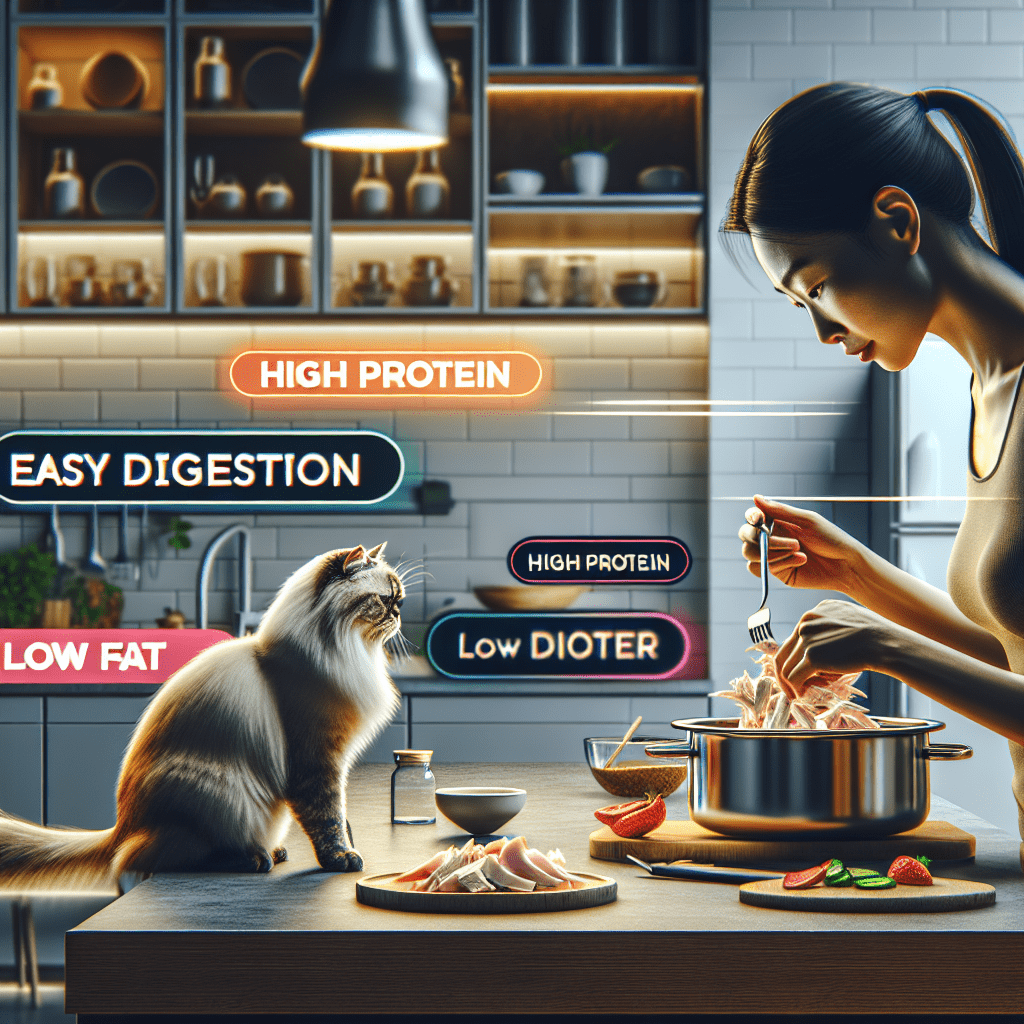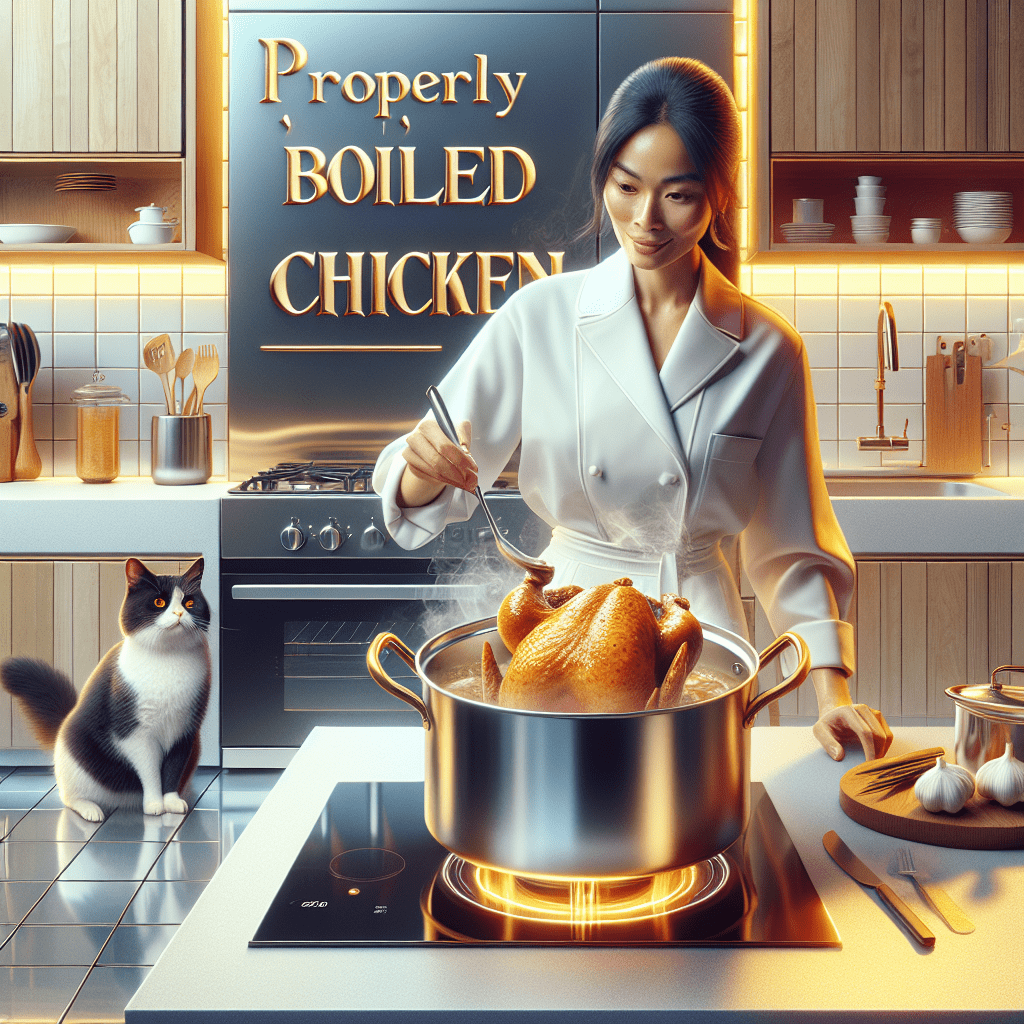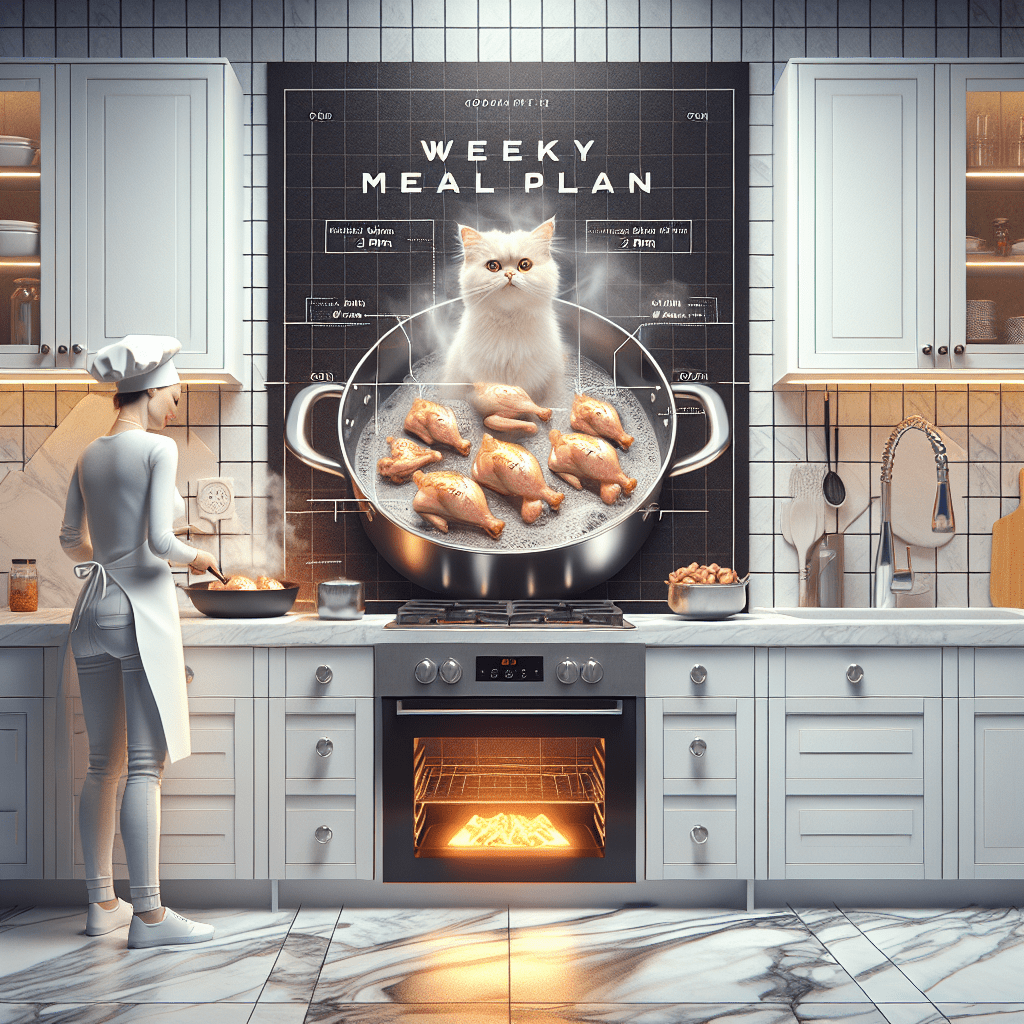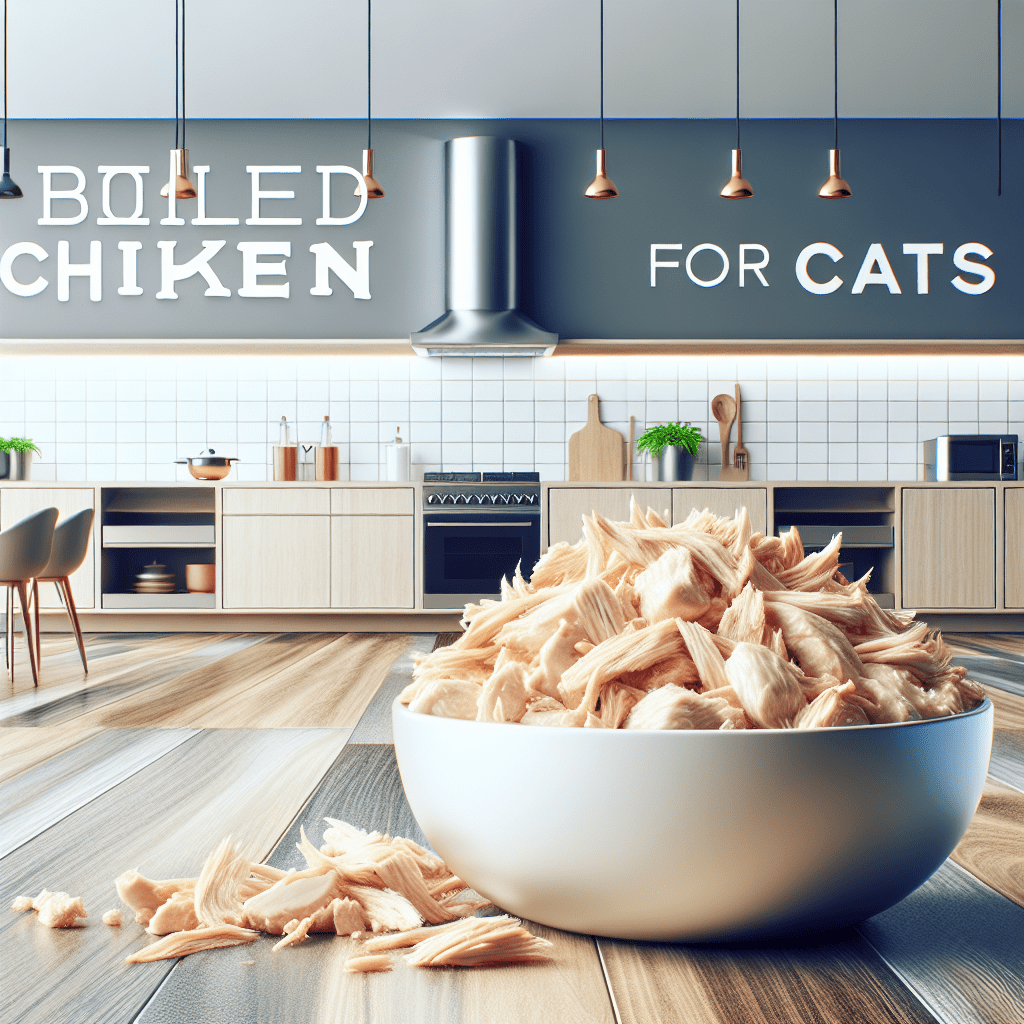Find Out Why Your Cat’s Health Depends on a Balanced Diet
Ensuring your kitty enjoys a balanced diet is vital to being a fantastic pet parent. Sure, commercial cat foods tick all the nutritional boxes, but sprinkling in homemade goodies can level up your feline’s feast. Top of the list? Boiled chicken for cats. It’s a cinch to prep, packed with nutrients and an absolute hit as a treat or meal booster. Ready to become a kitchen wizard for your cat? Let’s dive into the how-tos of boiling chicken for cats, unlock its benefits, and steer clear of the no-nos.
Table of Contents
Choosing the Right Chicken and Why It Matters
When it comes to preparing chicken for your cat, quality matters. Always opt for organic, free-range chicken if possible. These chickens are less likely to contain harmful antibiotics or hormones. Organic chicken also tends to be fresher and richer in nutrients, which benefits your cat’s overall health.
Check the packaging carefully to ensure the chicken is free from preservatives and additives. Avoid pre-seasoned or marinated chicken, as these can be harmful to cats. You’re ready to start boiling once you’ve selected the right chicken!

Step-by-Step Guide to Boiling Chicken for Your Cat
Step 1 Preparation
Start by rinsing the chicken under cold water. This removes any surface bacteria and impurities. Pat it dry with a paper towel. Remove these parts if the chicken has skin, bones, or excess fat. While bones are great for cat nutrition, they should be avoided when boiling as they can become brittle and pose a choking hazard.
Step 2 Boiling
Pop the chicken into a big pot and cover it with water until it’s completely underwater. Crank the stove to medium heat and gently wait for the water to bubble. Then, turn the heat down to keep a nice simmer going. Let the chicken cook for about 20 minutes or until it’s tender and cooked.
Step 3 Cooling and Shredding
After the chicken is cooked, take it out of the water and let it cool down. Once it’s cool enough to handle, shred it into small, bite-sized pieces. Double-check for any bones or skin and toss those out. And there you have it; your boiled chicken is all set to enjoy!
Safety Precautions to Consider
Avoid Seasonings and Additives
Never add salt, onions, garlic, or other seasonings to the chicken. These ingredients are harmful to cats. Stick to plain, unseasoned chicken to ensure your cat’s safety.
Monitor Cooking Time
Overcooking or undercooking the chicken can be problematic. Overcooked chicken can become too tough, while undercooked chicken can harbor harmful bacteria. Aim for perfectly cooked, tender chicken every time.
Store Properly
Pop any leftover boiled chicken into an airtight container and stash it in the fridge. Use it within three days to keep it fresh and safe for your kitty to munch on.

Benefits of Boiled Chicken for Cats
Nutritional Advantages
Boiled chicken offers cats a superb source of lean protein, which is crucial for developing and maintaining muscle tissue. At the same time, its low-fat content ensures it is a nutritious option. Additionally, chicken is rich in vital amino acids that comprehensively bolster your cat’s health.
Supports Hydration and Digestion
Boiled chicken is great for keeping your cat hydrated since it retains moisture. Plus, it’s super easy to digest because of how simply it’s prepared, so it’s less likely to upset your cat’s stomach.
Suitable for Cats with Health Conditions
If your cat’s dealing with health issues like kidney disease or food allergies, boiled chicken might be a good, nutritious pick. Always double-check with your vet before shaking up your cat’s menu, okay?

Common Mistakes to Avoid When Boiling Chicken for Cats
Overcooking or Undercooking
Be careful not to overcook the chicken – it can turn tough or dry, and your cat probably won’t be a fan. On the flip side, undercooked chicken might carry some nasty bacteria. Aim for perfectly cooked chicken every time, hitting that sweet spot.
Using Seasonings and Flavorings
Cats have sensitive digestive systems. Seasonings like garlic, onions, and salt can be toxic to them. Stick to plain chicken to avoid any health issues.
Not Removing Bones and Skin
Remove any bones and skin from boiled chicken before giving it to your cat. Bones can break into sharp pieces and lead to choking or even hurt them inside. So, it’s best to play it safe and remove them first.

Incorporating Boiled Chicken into Your Cat’s Diet
Meal Ideas and Portion Control
Boiled chicken can be served as a standalone treat or mixed into your cat’s food. Aim for small portions, especially if your cat is new to homemade food. Too much can upset their stomach.
Transitioning from Commercial Cat Food
If you transition your cat from commercial food to a diet that includes homemade items like boiled chicken, do so gradually. Mix small amounts of chicken into their regular food and increase over time.
Monitoring Your Cat’s Health
Make sure to watch how your cat reacts to new foods. If they seem uncomfortable or have any tummy troubles, it’s best to get on the phone with your vet right away.
Conclusion Recapping the Benefits and Importance of Boiled Chicken for Cats
Boiling chicken for your cat? Great idea! It’s packed with protein and super easy on their tummy, making it a top-notch choice for your furry pal. Just follow the guide I’ve put together, and you’ll be whipping up some homemade cat food like a pro.
Are you keen to dive deeper into cat nutrition or swap stories with fellow cat enthusiasts? Hit us on social media and join our awesome community of pet lovers. And if you’re on the hunt for more tailored advice or some excellent pet products, remember not to subscribe to our newsletter
Call-to-Action Encouraging Engagement
Hey there! Do you have any cool tips or stories about your cat’s diet? Please share them with us using #CatNutritionWithChicken. Remember to subscribe to our newsletter to get all the latest on pet health and some awesome deals. Please drop by our store for more cat-friendly goodies and boost your furry friend’s diet.
FAQ about Boiled Chicken for Cats
Can I feed my cat boiled chicken every day?
While boiled chicken is an excellent source of lean protein and beneficial nutrients, it should not be the sole component of your cat’s diet. Cats require a balanced diet with essential vitamins and minerals in commercial cat foods. Consult your vet for the best dietary plan for your cat’s needs.
Is boiled chicken safe for kittens?
Yes, boiled chicken can be a safe and nutritious addition to a kitten’s diet. However, ensuring the chicken is thoroughly cooked, free of seasonings, and shredded adequately into small pieces is crucial. Introduce it gradually, and always consult your vet before making significant dietary changes for your kitten.
How should I store leftover boiled chicken?
Ensure to store your leftover boiled chicken in an airtight container and place it in the refrigerator; it will remain fresh and safe for your cat to enjoy for up to three days. However, if it begins to look or smell odd, it’s time to discard it.
Can I use chicken broth to boil the chicken?
It’s recommended to use plain water to boil the chicken. Chicken broth often contains seasonings and ingredients like onions or garlic, which harm cats. Always opt for plain, unseasoned options when your pet doesn’t have food.
What should I do if the cat doesn’t like boiled chicken?
don’t cat doesn’t seem interested in boiled chicken, so don’t force it. Cats have individual preferences, just like humans. Mix small amounts of cooked chicken with their regular food or explore other healthy proteins that appeal to them. Always ensure any new food is introduced gradually to avoid digestive upset.
Sarah Smith is a passionate dog and cat enthusiast, blogger, and pet care expert. With years of experience researching and writing about various dog breeds cat breeds, she brings a wealth of knowledge and insight to her blog, PetPession.com. Sarah loves exploring the unique traits, histories, and care needs of different breeds, helping pet owners make informed decisions. Her mission is to create helpful, friendly, and well-researched content that both educates and celebrates the joy of pet ownership. When she’s not writing, Sarah enjoys outdoor adventures with her own furry friends.


1 thought on “The Ultimate Guide to Boiled Chicken for Cats”